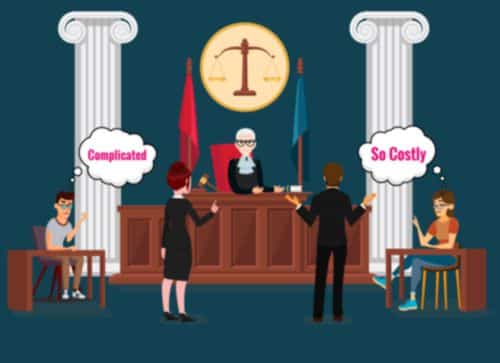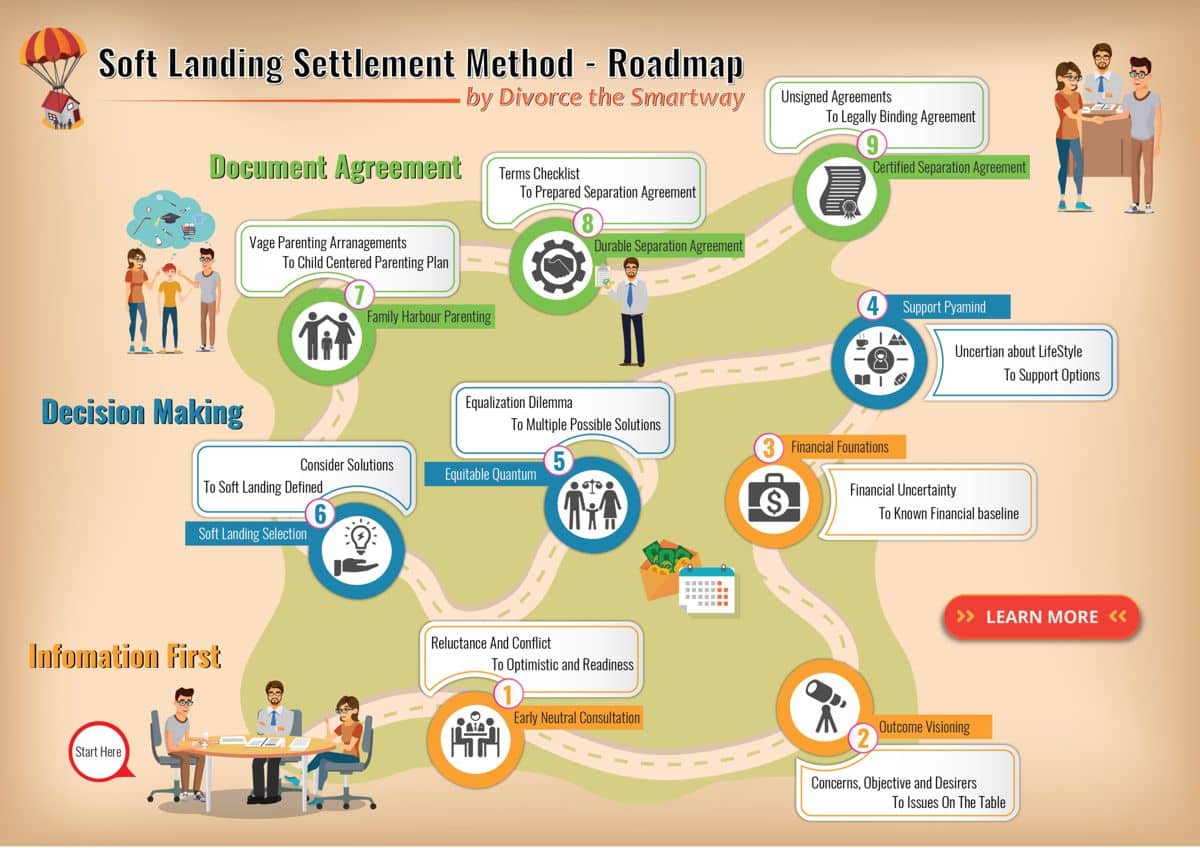The Truth about Collaborative Law in London Ontario
Introduction to Collaborative Law in London
Collaborative law is a transformative approach to resolving family disputes in [acf_views name=”city-prov” view-id=”6676c465aaee0″], offering an alternative to the adversarial nature of traditional litigation. The [acf_views name=”CollaborativeChapter” view-id=”6681ace9efe99″] serves the communities of [acf_views name=”communities” view-id=”6680736e5a5f4″].
[acf_views name=”CollaborativeChapter” view-id=”6681ace9efe99″] is a member of the Ontario Association of Collaborative Professionals, at the forefront of this movement.This group comprises specially trained professionals dedicated to helping families resolve disputes amicably and respectfully. In addition to this, we also introduce the unique Soft Landing Separation Divorce Settlement Method, a distinct approach that focuses on minimizing conflict, reducing costs, and fair and sustainable agreements.
Get Acquainted Call
Do you want a Soft Landing?
Have a few questions?
Learn More:
Schedule a 15-Minute Complimentary Call
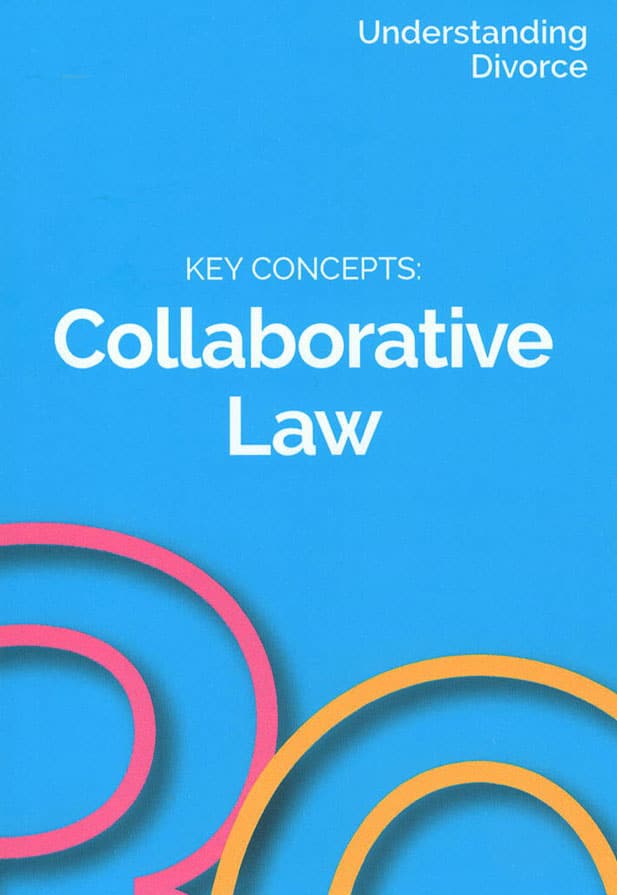
What is a Collaborative Lawyer?
A collaborative lawyer is a legal professional who specializes in the collaborative law process, an innovative and cooperative method designed to help parties resolve disputes without the need for contentious court battles.
Collaborative lawyers work with clients to negotiate and reach amicable solutions in a non-adversarial environment. They are committed to finding mutually beneficial outcomes and often collaborate with other professionals, such as financial advisors and mental health experts, to address all aspects of the dispute comprehensively.
Collaborative Law Terms
If you’re new to the collaborative approach to resolving legal disputes, it can be helpful to understand the specific terms and concepts used in this area. Collaborative law is an innovative and cooperative method designed to help parties reach amicable solutions without the need for contentious court battles, creating a non-adversarial environment.
Below, we will define key terms: collaborative family law, collaborative practice, collaborative divorce, and collaborative team practice. These definitions will help you grasp the different aspects of the collaborative process and how they work together to create a supportive and efficient environment for resolving disputes.
Collaborative Family Law
Definition: Collaborative family law is a process specifically aimed at helping families resolve disputes, particularly divorce, child custody, and other family-related issues. The primary goal is to reach amicable solutions that prioritize the family’s well-being, especially children, without litigation.
Collaborative Law
Definition: Collaborative law is a broader legal framework used to resolve disputes in various areas, including family law. It involves a voluntary process in which both parties and their lawyers commit to negotiating a settlement without going to court, focusing on cooperation and mutually beneficial outcomes.
Collaborative Practice
Definition: Collaborative practice applies the principles of collaborative law across different fields. It involves professionals from various disciplines, such as legal, financial, and mental health experts, working together to address all aspects of a dispute. This interdisciplinary approach ensures comprehensive solutions that meet the client’s needs.
Collaborative Divorce
Definition: Collaborative divorce is a subset of collaborative family law that resolves divorce-related issues, such as property division, child custody, and spousal support, without litigation. It aims to reach a fair and satisfactory out-of-court settlement for both parties.
Collaborative Team Practice
 Definition: Collaborative team practice involves a team of professionals from different fields working together to resolve a dispute using collaborative law principles. This multi-disciplinary team typically includes lawyers, financial advisors, mental health professionals, and other relevant experts, all contributing their expertise to find holistic and integrated solutions, ensuring a comprehensive approach to dispute resolution.
Definition: Collaborative team practice involves a team of professionals from different fields working together to resolve a dispute using collaborative law principles. This multi-disciplinary team typically includes lawyers, financial advisors, mental health professionals, and other relevant experts, all contributing their expertise to find holistic and integrated solutions, ensuring a comprehensive approach to dispute resolution.
Understanding the Differences
While all these terms share the common goal of resolving disputes collaboratively, they differ in scope and application. Collaborative family law and divorce focus on family-related issues, whereas collaborative law and practice have broader applications. Collaborative team practice emphasizes using a multi-disciplinary team to address various aspects of a dispute comprehensively.
By understanding these terms, you can better appreciate the collaborative approach and how it can provide a supportive, efficient, and less adversarial path to resolving legal disputes.
About [acf_views name=”CollaborativeChapter” view-id=”6681ace9efe99″]
This Collaborative Law organization aims to create a supportive environment where families, including you, can work together to reach mutually acceptable solutions. This voluntary process involves open communication and cooperation to minimize conflict and prioritize the well-being of all parties, especially children.
By focusing on collaboration rather than confrontation, the group helps families, like yours, navigate the complexities of separation and divorce with dignity and respect.
How does Collaborative Law Work
Process
- Non-adversarial
- Collaborative law allows you to resolve disputes respectfully and without going to court.
Mediator Absent
- No mediator is involved in the collaborative process.
Financial Information
- All financial information is voluntarily disclosed, ensuring transparency and trust.
The Process
Both parties will meet with if needed:
- Collaborative Divorce Lawyer
- Financial Specialists
- Child Specialists
- Family Coaches
Both party lawyers play a facilitative role in joint meetings, ensuring that the process is fair and that both parties’ interests are represented.
Which Process is Right for You?
In collaborative law, there is no real fear of domestic violence, as the process is designed to be respectful and non-confrontational. However, other dispute-resolution methods may be more appropriate if there are safety concerns.
- Both parties must agree to participate.
- You can speak for yourself.
- You are willing to listen to the views and concerns of your spouse.
- You aim to negotiate a mutually acceptable settlement and prefer not to leave decisions regarding your children and property to a judge.
Types of Cases
- Both parties are willing to listen objectively to each other’s needs and wants, directly or through their lawyers.
- Both parties are willing to negotiate in good faith.
- Mutual Respect both parties in the collaborative process respect each other’s needs and concerns, fostering a sense of value and respect.
- Children’s Best Interests both parties in the collaborative process share a common goal of ensuring the best for the children, fostering a sense of responsibility and reassurance.
- If one party is unwilling to relinquish power or has a substantial educational or psychological disadvantage, this type of divorce may not work for you.
Confidentiality
- The process is private and confidential.
- All documents prepared for the collaborative negotiations are confidential.
- All matters discussed in a session remain confidential.
- If submitted to the court, only the final agreement becomes a public document.
Time Required for Resolution
- The process typically takes 120 days to 6 months.
- It involves several meetings of lawyers and clients.
- Meetings with experts are also part of the process.
Decision Maker
With advice from your lawyer, you and your spouse make the decision.
Outcome
The collaborative lawyers prepare a separation agreement. When signed by both parties, it becomes a binding and enforceable court contract.
Benefits of Collaborative Law in Family Disputes
Collaborative family law offers numerous benefits, making it an attractive option for many families in [acf_views name=”city” view-id=”66799eefe25de”]. Here are some key advantages, including:
Preservation of Relationships
Collaborative law focuses on maintaining respectful and constructive communication, which can preserve relationships, mainly when children are involved. By working together, parents can develop co-parenting plans that prioritize their children’s well-being.
Cost-Effective
The collaborative process is often less expensive than traditional litigation. Families can save money and allocate resources more effectively by avoiding court battles and minimizing legal fees.
Control Over Outcomes
In collaborative law, the parties have the power to shape the outcome of their case. They can customize agreements to their unique needs and circumstances, empowering them to make decisions that best suit their situation, rather than having rulings imposed by a judge.
Confidentiality
Collaborative law proceedings are private and confidential, allowing families to resolve their disputes without the public exposure associated with court cases.
Reduced Stress
The collaborative process is intentionally designed to be less adversarial and stressful than traditional litigation. Families can navigate their disputes with a greater sense of calm and reassurance, fostering a cooperative environment that eases tension and promotes understanding.
Limitations of Collaborative Law in Family Disputes
While collaborative family law offers many benefits, it also has limitations that families should consider:
Not Suitable for All Cases
Collaborative law may not be appropriate in cases involving domestic violence, power imbalances, or situations where one party is unwilling to cooperate. Traditional litigation or other dispute resolution methods may be more suitable in such cases.
Commitment Required
Both parties must be committed for the collaborative process to be successful. The process may break down if one party is not fully invested in it.
Potential for Higher Costs
In some cases, if the collaborative process is unsuccessful and the parties resort to litigation, the overall costs can be higher due to the additional time and resources spent on both methods.
Misconceptions About Collaborative Professionals
There are misconceptions that all collaborative professionals are the same. It’s essential to recognize that true collaborative professionals have specific training and adhere to the principles of collaborative law. The 80/20 rule, where 80% of the work is done by 20% of the professionals, can apply here. Ensure you are working with experienced and dedicated practitioners.
Traditional Litigation vs Collaborative Law
Collaborative Family Law
Collaborative family law emphasizes cooperation, mutual respect, and open communication. The parties and their collaborative lawyers commit to resolving disputes outside of court and work together to reach mutually beneficial agreements. This approach is particularly suited to families who wish to maintain positive relationships and control over the outcome of their case.
Traditional Litigation
Traditional litigation involves a more adversarial process, where each party is represented by a lawyer who advocates for their interests in court. A judge ultimately makes decisions on the disputed issues. While litigation can be necessary in some cases, it often leads to increased conflict, higher costs, and less control over the outcome.
Key Differences
- Control: In collaborative law, the parties control the outcome; in litigation, the judge makes the final decisions.
- Cost: Collaborative law is generally more cost-effective than litigation.
- Stress: Collaborative law aims to reduce stress and maintain respectful communication, while litigation can be more adversarial and stressful.
- Confidentiality: Collaborative law proceedings are private, whereas litigation is a matter of public record.
Misconceptions About Collaborative Divorce
There are several common misconceptions about collaborative family law that can deter families from considering this approach:
Misconception 1: Collaborative Law is Only for Amicable Divorces
While collaborative law works well for amicable separations, it is also effective for high-conflict cases. The structured process and involvement of trained professionals can help constructively manage and resolve conflicts.
Misconception 2: Collaborative Law is the Same as Mediation
Although both approaches are alternative dispute resolution methods, they are distinct. In collaborative law, each party has a lawyer, which involves a team approach. Mediation typically involves a neutral mediator who facilitates discussions between the parties.
Misconception 3: Collaborative Law is Less Effective
Collaborative law can be highly effective in reaching durable and satisfactory agreements. The key is the commitment of both parties and the expertise of the professionals involved.
Misconception 4: Collaborative Law is Expensive
While collaborative law has costs, it is often more cost-effective than litigation. Focusing on cooperation and efficiency can lead to quicker resolutions and lower overall expenses.
Mediation vs Collaborative Family Law
Collaborative Family Law
-
- Team Approach: Involves a team of professionals, including collaborative lawyers, financial specialists, and mental health experts.
- Legal Representation: Each party has a lawyer to provide legal advice and advocacy.
- Structured Process: Follows a structured process committed to resolving disputes outside of court.
Mediation
-
- Neutral Mediator: A neutral mediator facilitates discussions and helps the parties reach an agreement.
- No Legal Representation: Parties may or may not have their lawyers present during mediation sessions.
- Flexible Process: Mediation is more flexible and can be tailored to the parties’ needs.
Suitability
-
- Collaborative Family Law: Suitable for cases where parties need legal representation and a structured process to manage complex issues.
- Mediation: Suitable for cases where parties are willing to negotiate directly with the help of a mediator and may not require extensive legal advice.
Choosing a Collaborative Lawyer
When seeking legal assistance for a collaborative law case, selecting the right lawyer to represent your interests is crucial. Collaborative law aims to promote amicable resolution and minimize conflicts, potentially leading to a more positive and less stressful legal experience. Ask the right questions when choosing a collaborative lawyer to ensure a successful outcome. In this article, we will discuss the essential questions to consider, evaluate the success rate of a collaborative lawyer, explore successful case studies, and highlight critical qualities to look for in a collaborative lawyer.
Red Flags to Watch Out for When Selecting a Collaborative Lawyer
When choosing a collaborative lawyer, there are certain red flags to be aware of. One of the first things to consider is the lawyer’s level of experience in collaborative law cases. Collaborative law requires specialized training and skills, so it is essential to ensure that your lawyer has the necessary expertise.
Additionally, be wary of any lawyer who discourages communication and cooperation between you and your spouse. A collaborative lawyer should encourage open dialogue and actively work towards finding mutually beneficial solutions.
Another red flag is if your lawyer needs a strong network of professionals who can assist with various aspects of your case. Collaborative law often involves financial experts, child specialists, and mental health professionals. A well-connected lawyer will bring in the right experts to support your case, enhancing the collaborative process and ensuring all aspects of your case are adequately addressed.
Furthermore, beware of lawyers who prioritize their interests over yours. A collaborative lawyer should always prioritize the best interests of their client. Pay attention to how your lawyer handles conflicts within the process. A red flag to watch out for is if your lawyer seems to escalate conflicts rather than help resolve them. A skilled collaborative lawyer will have conflict resolution skills and strive to maintain a respectful and productive environment.
Also, be cautious of lawyers who do not fully explain the collaborative law process or rush you into making decisions without fully understanding your options. Take note of how your lawyer interacts with you during initial consultations. If your lawyer does not actively listen to your concerns or seems disinterested in your goals, it may be a sign that they are not fully committed to helping you achieve a positive outcome.
How to Evaluate the Success Rate of a Collaborative Lawyer
Evaluating the success rate of a collaborative lawyer is crucial in making an informed decision. While success rates can vary, there are specific indicators to gauge a lawyer’s effectiveness. One important metric is the lawyer’s track record of successfully resolving cases through negotiation and collaboration. Ask potential lawyers about their success stories and how frequently they achieve favourable outcomes without litigation.
Additionally, request references or testimonials from past clients to gain insight into their experience with the lawyer. Hearing from others who have gone through the collaborative law process can provide valuable information and give you confidence in your decision. Seek online reviews or professional recommendations to assess a lawyer’s success rate further.
When evaluating a collaborative lawyer’s success rate, consider their experience and expertise in the specific area of law relevant to your case. A lawyer with specialized knowledge and a proven track record in handling cases similar to yours is more likely to achieve successful outcomes through collaboration. Please inquire about the lawyer’s training in collaborative law and any certifications or recognitions they have received.
Assessing the lawyer’s communication and interpersonal skills is crucial in determining their effectiveness in collaborative negotiations. A lawyer who can effectively communicate, actively listen, and build rapport with all parties involved is better equipped to facilitate productive discussions and reach mutually beneficial agreements. Please gauge how the lawyer interacts with you during your initial consultation to gauge their communication style and approach.
Essential Qualities to Look for in a Collaborative Lawyer
When selecting a collaborative lawyer, several key qualities to consider are: First, seek a lawyer who demonstrates excellent communication skills. Effective communication is crucial to the collaborative law process, as it fosters cooperation and enables parties to reach mutually beneficial agreements.
Moreover, look for a lawyer who possesses strong negotiation skills. Collaborative law relies on negotiation rather than litigation, so it is essential to have a lawyer who can effectively advocate for your interests while maintaining a respectful and cooperative approach.
Another essential quality to look for is empathy. Collaborative law cases involve sensitive issues, and a lawyer who can understand and empathize with your emotions will be better equipped to guide you through the process.
Furthermore, a collaborative lawyer should be committed to ongoing education and staying up-to-date with the latest developments in collaborative law. This commitment demonstrates their dedication to providing the best possible representation.
Considering a lawyer’s experience in handling collaborative law cases is also beneficial. An experienced collaborative lawyer will have a deep understanding of the nuances of this specialized area of law, allowing them to navigate complex situations with ease and efficiency.
Moreover, a lawyer with a strong network within the collaborative law community can be advantageous. Connections with other collaborative professionals, such as financial specialists or mental health professionals, can enhance the collaborative process and provide additional support and resources for clients.
Lastly, when choosing a collaborative lawyer, assessing their approach to conflict resolution is essential. A lawyer prioritizing finding amicable solutions and promoting positive communication between parties can contribute to a more prosperous and less adversarial collaborative law experience.
Preparing for Your Initial Consultation with a Collaborative Lawyer
Before meeting with potential collaborative lawyers, you must be prepared for your initial consultation. Take the time to gather all relevant documents related to your case, such as financial records, property agreements, and any existing legal documents. These readily available materials will allow the lawyer to understand your situation better and provide more accurate advice.
Additionally, prepare a list of questions to ask during the consultation. This will help you gather important information about the lawyer’s experience, approach to collaborative law, and how they plan to handle your case. Take notes during the consultation to help you remember the details of each lawyer’s response.
When preparing for your initial consultation, creating a timeline of events related to your case can also be helpful. This can provide the lawyer with a clear overview of the situation and help them identify any potential issues that may need to be addressed. A timeline can streamline the consultation process and ensure all relevant details are discussed.
Lastly, during the consultation, it’s important to trust your instincts. Collaborative law cases can be emotionally challenging, so choosing a lawyer who makes you feel comfortable and supported throughout the process is essential. Your comfort and trust in your lawyer are key to a successful collaborative law experience.
Choosing the right collaborative lawyer is a critical decision that can significantly impact the outcome of your case. By asking the right questions, evaluating success rates, and considering essential qualities, you can confidently select a lawyer who will guide you through the collaborative law process and help you achieve a favourable resolution. Collaboration is critical in collaborative law, so finding a lawyer who embodies the spirit of cooperation and has the necessary expertise is essential for a successful outcome.
Not all Lawyers are Collaborative
It’s crucial for clients to thoroughly vet their chosen professionals, ensuring they have the proper training and a genuine commitment to the collaborative process. Checking credentials, experience, and client reviews can help in selecting a truly collaborative lawyer.
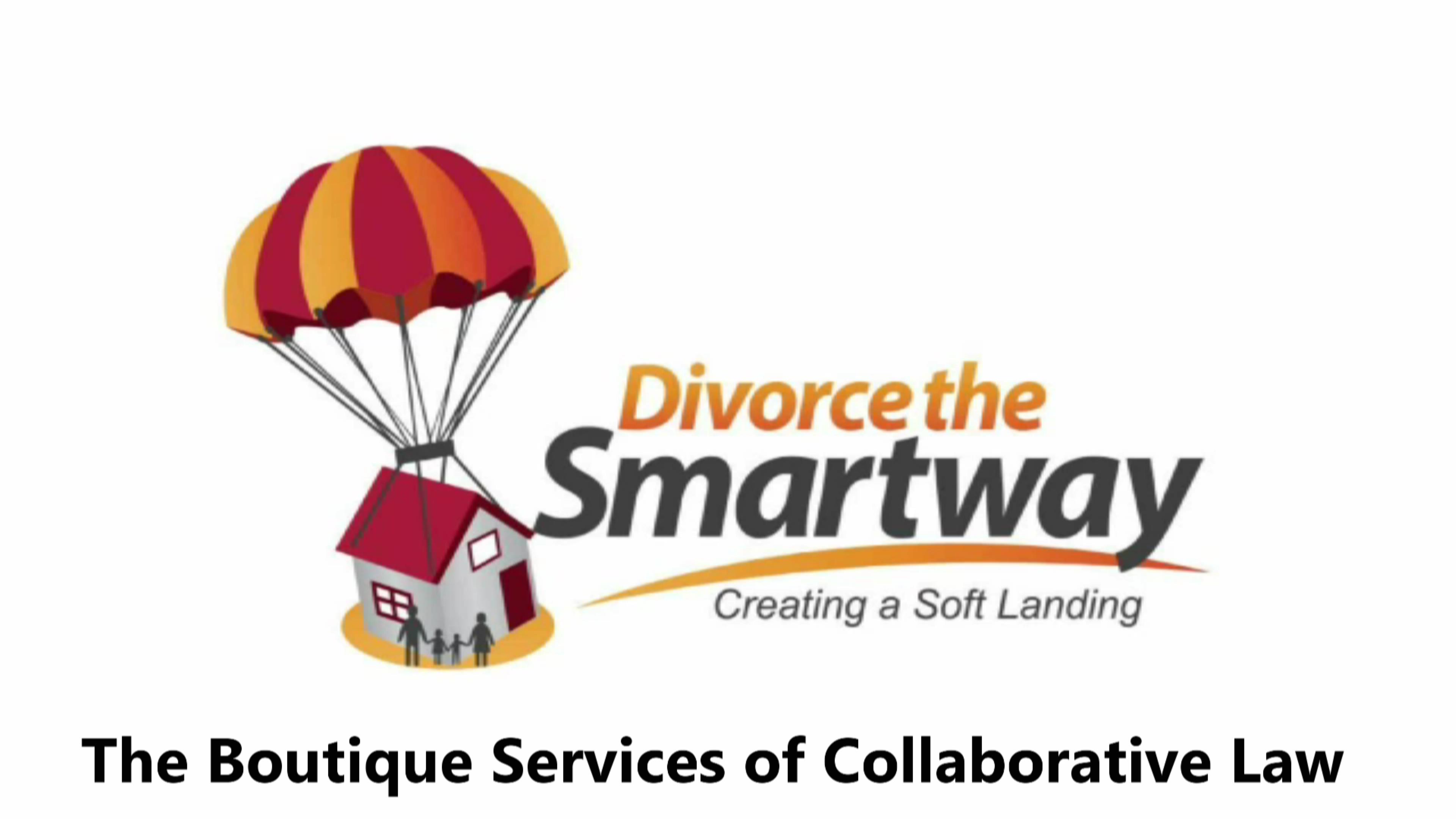
Divorce in Ontario - Collaborative Law
Financial specialists provide neutral expertise to help divorcing couples make informed decisions about assets, budgets, and long-term financial planning.
In collaborative divorce, financial specialists serve as neutral third-party experts who help both spouses understand their complete financial picture and develop equitable solutions. These professionals analyze and explain:
- Asset and debt valuation, including property, investments, and retirement accounts
- Tax implications of various settlement options
- Post-divorce budget planning and lifestyle adjustments
- Long-term financial projections and retirement planning
- Business valuations and complex asset distributions
By working with a certified divorce financial analyst or similar specialist, couples can avoid costly mistakes and develop sustainable agreements that protect both parties’ financial futures. Their expertise helps reduce conflict and ensures transparency throughout the collaborative divorce process.
Collaborative divorce has specific limitations around cost, commitment, and certain relationship dynamics
While collaborative divorce offers many benefits, it’s important to understand its potential drawbacks before proceeding. The process comes with several key considerations that may impact its suitability for your situation.
- Financial risk: If negotiations break down, both parties must hire new lawyers, essentially starting over and doubling legal costs
- Time commitment: Success requires active participation and full engagement from both spouses throughout the entire process
- Transparency requirements: Both parties must commit to complete financial disclosure and honest communication
- Not suitable for all situations: Cases involving domestic violence, power imbalances, or uncooperative parties are better handled through traditional divorce proceedings
- Emotional readiness: Both spouses must be emotionally prepared to work together constructively despite their differences
Cost of Collaborative Law
Very costly. Depending on your lawyer fees.
- Meetings
- Correspondence
- Drafting of the agreement
- Collaborative Law in Toronto and other major centers in Canada starts at $15,000 for each spouse.
Tables of Contents
- Introduction to Collaborative Law in London
- Get Acquainted Call
- What is a Collaborative Lawyer?
- Collaborative Law Terms
- How does Collaborative Law Work
- Benefits of Collaborative Law in Family Disputes
- Traditional Litigation vs Collaborative Law
- Misconceptions About Collaborative Divorce
- Mediation vs Collaborative Family Law
- Choosing a Collaborative Lawyer
- Not all Lawyers are Collaborative
- Cost of Collaborative Law
- 11 Key Takeaways about Collaborative Family Law in London
- Get Acquainted Call
- Better Value For Your Money
- At DTSW
- Ken S, Maynard CDFA Acc.FM
11 Key Takeaways about Collaborative Family Law in London
- Collaborative Family Law Approach: Aims to resolve family disputes amicably through cooperation rather than confrontation.
- Professional Support: Involves specially trained professionals including lawyers, financial specialists, and mental health experts.
- Voluntary Process: Both parties agree to work together voluntarily to reach mutually acceptable solutions.
- Preservation of Relationships: Focuses on maintaining respectful communication, especially important for co-parenting.
- Cost-Effective: Generally less expensive than traditional litigation.
- Control Over Outcomes: Parties have control over the final agreement, rather than having decisions imposed by a judge.
- Confidentiality: Proceedings are private and confidential.
- Stress Reduction: Designed to be less adversarial and stressful compared to traditional court cases.
- Not Suitable for All Cases: May not be appropriate in situations involving domestic violence or unwilling participants.
- Misconceptions: Collaborative law is not just for amicable divorces and differs significantly from mediation.
- Soft Landing Method: An alternative approach provided by Divorce the Smartway, emphasizing efficiency, reduced conflict, and tailored solutions.
Get Acquainted Call
Do you want a Soft Landing?
Have a few questions?
Learn More:
Schedule a 15-Minute Complimentary Call
Alternative to Collaborative Law
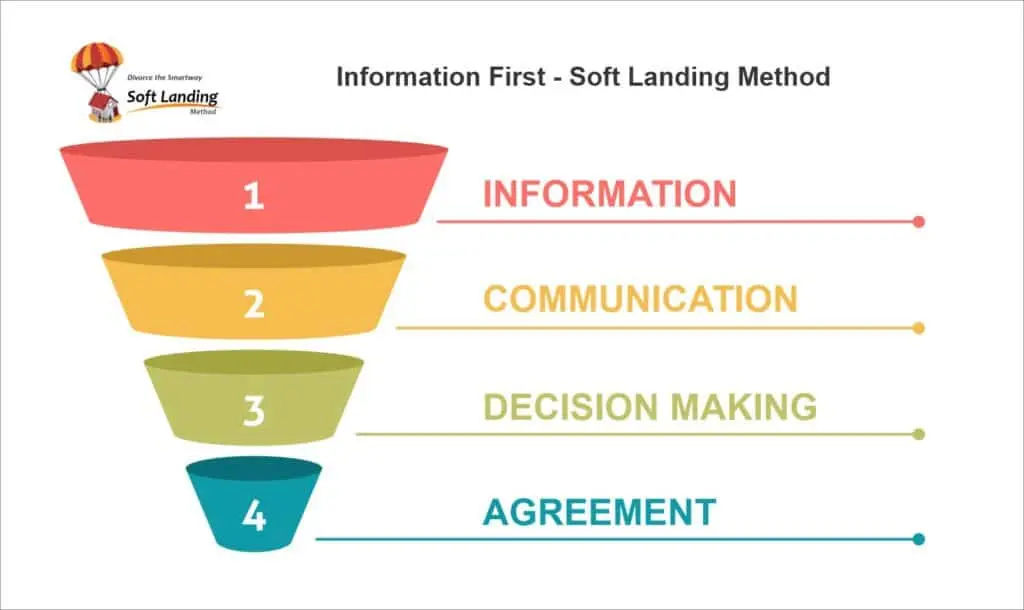
The Soft Landing Separation Divorce Settlement Method is an innovative approach designed to provide a smooth transition through separation and divorce. It minimizes conflict, reduces costs, and achieves fair and sustainable agreements. This method is particularly viable as an alternative to Collaborative Family law.
Role of a Certified Divorce Financial Analyst (CDFA)
At Divorce the Smartway (DTSW), a Certified Divorce Financial Analyst (CDFA) plays a crucial role in the Soft Landing Method. The CDFA provides specialized financial expertise to help couples understand the economic implications of their decisions and develop equitable settlements.
Key Features of the Soft Landing Method
- Four Meetings or Less: The process aims to resolve disputes in four meetings or less, making it efficient and cost-effective.
- Video Conference and In-Person Options: Clients can work with DTSW via video conference or in person at any of the six Greater Toronto mediation centers.
- Focus on Future Security: The method emphasizes crafting clear, straightforward separation agreements that ensure a secure future for both parties.
Benefits
- Efficiency: The Soft Landing Method is designed to be quick and efficient, reducing the time and stress associated with prolonged disputes.
- Cost-Effective: By minimizing the number of meetings and focusing on practical solutions, the method helps reduce legal and financial costs.
- Customized Solutions: The technique allows for tailored agreements that consider each family’s unique needs and circumstances.
Conclusion:
How Soft Landing Divorce Settlement Method Can Help
Navigating family disputes can be challenging, but understanding the available options can help you make informed decisions. Collaborative Family Law offers a respectful and cooperative approach to resolving disputes, preserving relationships, and reducing stress.
However, it’s essential to recognize its limitations and consider alternative methods like the Soft Landing Separation Divorce Settlement Method.
At the Divorce the Smartway, we understand the complexities of family disputes and are committed to providing support and guidance. The Soft Landing Method can give a smooth and efficient path to resolution, ensuring that your future is secure.
If you’re facing a family dispute, we encourage you to explore the options available and schedule a “Get Acquainted Call” with us. Let us help you navigate this challenging time with compassion and expertise. Schedule a Get Acquainted Call
In conclusion, collaborative family law and the Soft Landing Method offer valuable approaches to resolving family disputes. By understanding their benefits and limitations, you can choose the path that best suits your needs and ensures a positive outcome for your family.
Better Value For Your Money
Our Soft Landing Divorce Settlement Method
Our time-tested, success-proven settlement method will move you to resolution in good time and at a fair cost.
At DTSW
We understand that navigating a divorce can be overwhelming and emotionally draining. Our Team of Family Mediators and Certified Divorce Financial Analysts are dedicated to making this process as smooth as possible.
Our Soft Landing Divorce Settlement Method is designed to provide a compassionate and structured approach to help you reach an amicable agreement that prioritizes your needs and those of your family. Don’t face this challenging time alone—
[acf_views name=”AcquaintedCall” view-id=”6688500b3125f”] to learn how we can support youKen S, Maynard CDFA Acc.FM

Profile
Becoming a Certified Divorce Financial Analyst and Mediator was more than a professional choice for me; it was a deeply personal journey. In 2007, I navigated the family court system myself, an experience that was both challenging and enlightening. This journey inspired me to use my financial expertise to assist others facing similar situations. Growing up with practical money management skills from my family’s agribusiness, I further honed my abilities in Real Estate restructuring and as an analyst at two of Canada’s largest mutual fund managers.
I am dedicated to empowering parties to make informed decisions, recognizing that multiple solutions exist for every dilemma during the settlement process. My approach is rooted in patience and thoroughness, ensuring that every voice is heard.
I offer a comprehensive suite of services, leaving no stone unturned in addressing your divorce financial analysis and mediation needs. From information gathering to analysis, settlement negotiations, and document drafting, I guide you through every step of the way. Using an interest-based negotiation approach, I tailor my services to meet each couple’s unique needs.
What truly sets my services apart is our proprietary Soft Landing Divorce Settlement Method. This method is not just a tool but a testament to our commitment to your well-being. It is designed to facilitate smoother and more amicable settlements, ensuring that both parties feel heard and their needs are met.
The process begins with a “Get Acquainted” call, often conducted jointly but available individually. During this call, I will explain my hybrid fee schedule, which combines a flat fee for certain services and an hourly rate for others, and address any questions about the Soft Landing Separation and Divorce Settlement Method. Upon agreement, we proceed with the mediation process.
Many clients initially dismiss mediation due to preconceived notions or external influences. However, mediation invariably adds value to the separation process by narrowing issues and testing settlement perceptions against reality.
I am available most weekdays and work with couples across Ontario via Zoom video conference. Clients can also choose to meet with one of my highly trained associate mediators at various locations throughout the province.
Away from the Office
I have three young adult children who have grown into fine, productive members of society. My oldest is a Private Equity Banker, my middle child is a Nurse, and my youngest is a Digital Marketer. They were raised with strong values that give them the resiliency to navigate their parents’ separation at a young age and build quality personal relationships.
Away from the office, I love to chill out by taking my beach chair to our local beach. With neighbors and friends, we set our chairs at the water’s edge and let the waves roll in, enjoying conversations about nothing overly important. My hobby is digital marketing, and I take great enjoyment in growth hacking my business and sharing what I learn with my Digital Marketer daughter.
I actively attend and contribute to the Institute of Divorce Financial Analysts and the Ontario Association of Family Mediation
Links to additional resources you may find useful
- DivorceCare – Divorce Recovery Support Group in London, Ontario: Find help and healing for separation and divorce.
- Divorce Support Group on Reddit: Connect with others for support and share experiences.
- Separation and Divorce – UWO Family Support: Resources to assist with separation or divorce.
- London Ontario Woman Separation/Divorce Support Group on Facebook: Private group for local women to support each other.
- New Hope London – DivorceCare Seasonal Groups: Support groups for healing from separation or divorce.
- Broken Relationships, Separation and Divorce Care – Summerside Church: 13-week program offering a safe place to heal.
- Find Divorce Group Therapy and Support Groups in Ontario: Connect with the best group therapy near you.
- Separation and Divorce – Ontario Mental Health Services: Directory of services and support for separation and divorce.
- Family Law Information Centre – London and Middlesex: Resources on separation, divorce, and child welfare.
- Supervised Access Program – London: Support for families with custody difficulties during separation and divorce.
- Find Divorce Support Events & Groups in London, CA – Meetup: Discover local support groups and events.
- Separation – Legal Aid Ontario: Help and support for separation legal issues.
- Find Divorce Therapists and Psychologists in London, ON: Connect with the right divorce therapist near you.
- Family Mediation Service Providers – Ontario: Help individuals resolve disagreements during separation or divorce.


